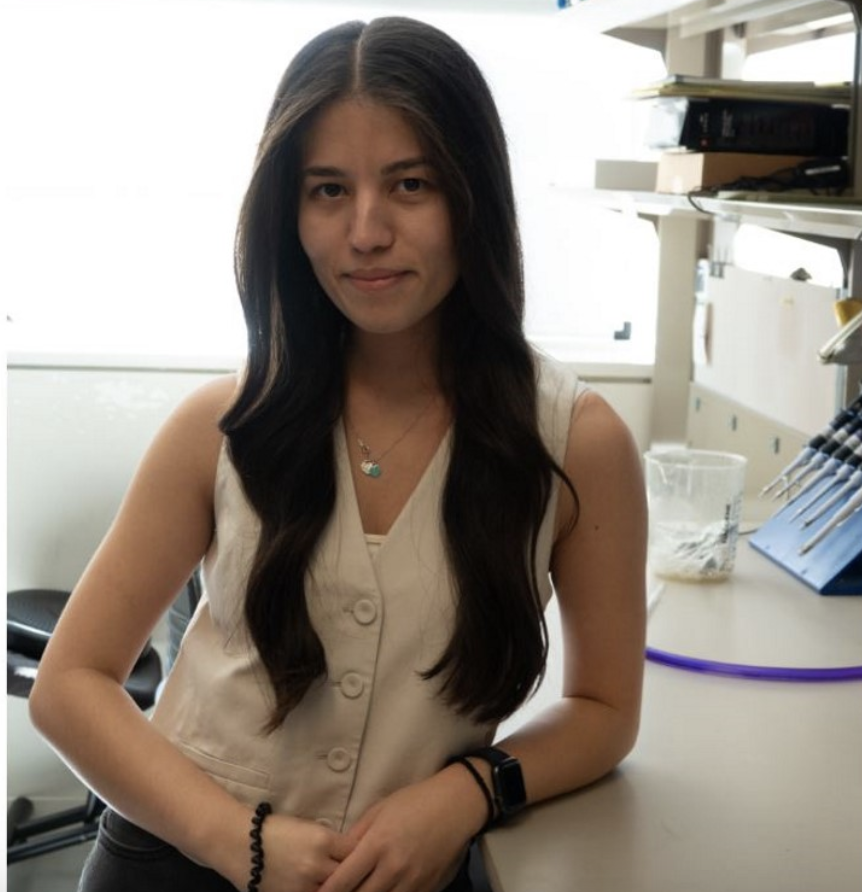
Amina Khasanova ('26), a Biology major, conducted research on the role of nuclear speckles in gene expression under the mentorship of Dr. Shelley Berger (Departments of Cell and Developmental Biology, Genetics, and Biology) through the support of the College Alumni Society Undergraduate Research Grant.
My initial interest in the Berger Lab was driven by my interest in cancer research, particularly in understanding how genetic mechanisms are explored by researchers. When I joined this lab, I was introduced to nuclear speckles for the first time. These membrane-less bodies within the cell nucleus have fascinated scientists as emerging evidence, including work from our lab, suggests that nuclear speckles may play a crucial role in enhancing the expression of a specific subset of genes. As I became familiar with the previously published studies, I became captivated by the idea of exploring cancer and gene expression through these relatively unexplored nuclear structures. This research is especially meaningful to me because it aligns with my aspiration to become an oncologist. It provides me with a unique opportunity to explore cancer at the genetic level, deepening my understanding of the disease. By examining how researchers develop potential cancer treatments, which oncologists then apply in clinical settings, I’ve gained a broader perspective on cancer research. One of the most significant lessons I’ve learned is that there isn’t a single approach to finding cures or solutions for diseases. Scientific research cultivates creativity, allowing researchers to explore diverse and innovative paths in answering complex questions.
My research experience also introduced me to numerous new people, both within and outside my lab. One of the most significant connections I made was with my mentor. Her kindness and patience made me feel comfortable from the very beginning. She consistently took the time to explain complex concepts, answer all of my questions, and reassure me that it was okay to admit when I didn’t understand something or made a mistake. Her patience, especially when I was first learning new techniques and struggling with tasks like pipetting, made the learning process much smoother and more enjoyable. In the lab, I also had the opportunity to interact with peers working on different projects, such as neurodegenerative diseases, and learn about their research. I was struck by the open-mindedness of everyone in the lab. I enjoyed getting to know my lab mates both professionally and personally. One of my favorite memories is introducing my lab mentors to my culture’s cuisine by taking them to an Uzbek restaurant to try traditional dishes. Another highlight was our lab’s annual hike, where we bonded and learned more about each other outside the lab setting. Beyond my own lab, I also met people from other labs with whom we collaborated, gaining insight into their work and expanding my scientific horizons. These connections were not only valuable for the new scientific knowledge they provided but also for the personal growth they fostered.
One of the most challenging aspects of my experience was realizing that it was far more difficult than I had anticipated. In movies, research often appears straightforward and effortless, but the reality was quite different. As an undergraduate who had not yet taken advanced biology courses, I found myself struggling to grasp the basics of my project. I had to read numerous scientific papers just to understand the foundational concepts. The jargon used in these papers and the complex graphs from analyses I had never encountered before were particularly challenging. Fortunately, my mentor was incredibly supportive as she guided me through each paper, section by section, and helped me interpret the graphs. This process was a steep learning curve, but it was essential for my growth as a researcher.
Public speaking was another major challenge for me. My PI encouraged the undergraduates in our lab to present at lab meetings and share our progress, which was nerve-wracking, especially since I had a deep fear of public speaking. However, as I gained more practice and became more knowledgeable about my research, my fear began to subside. Over time, I grew more confident in my ability to present my work, and I learned that facing these challenges was crucial for my personal and professional development. I was able to present my research at a lab meeting this summer and received feedback on my project and analyses which helped me see the benefit of meetings where work can be constructively criticized. This experience taught me resilience, patience, and the value of continuous learning, all of which have significantly contributed to my growth as a researcher.
Interested in reading more first-hand accounts about undergraduate research? Check out the other experiences featured on our Student News Page and Social Media!